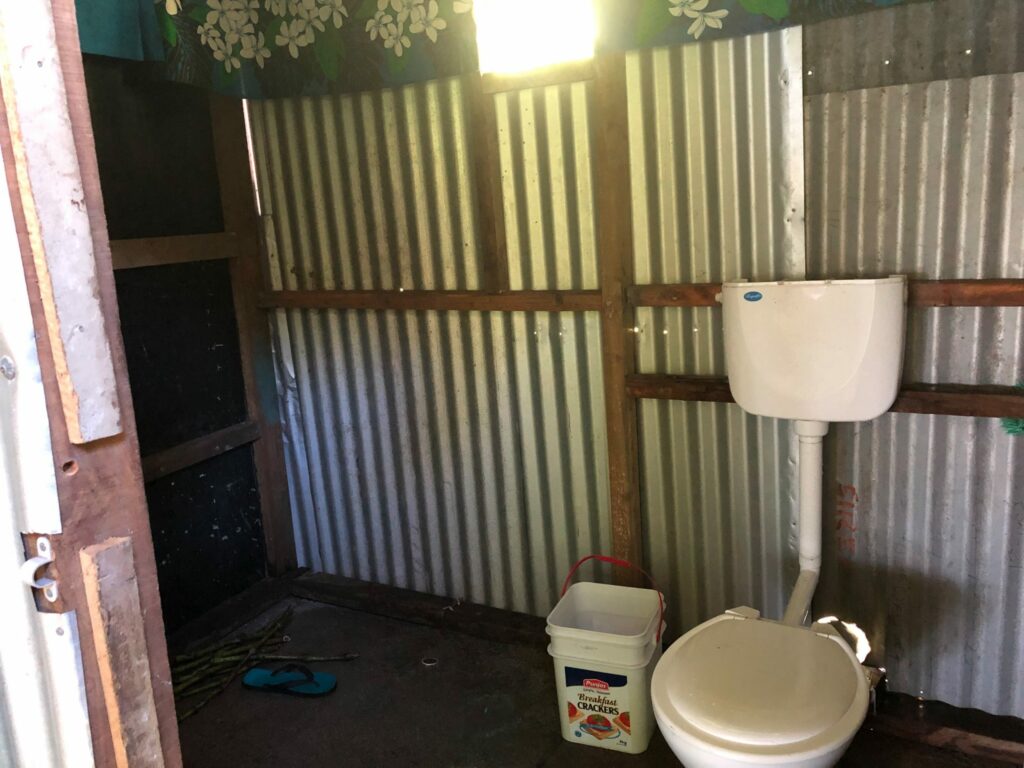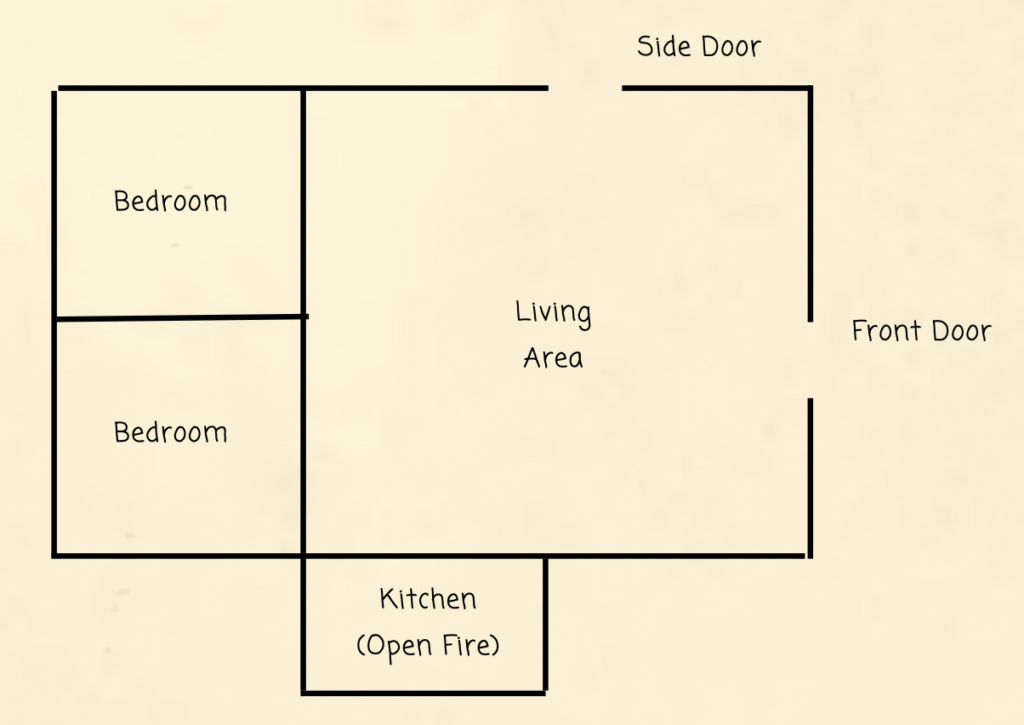
Challenges – Adapting to a Fijian Village
Everyone will encounter challenges when taking on a Think Pacific project, whether that is learning and practicing new skills or throwing yourself into an entirely new setting for the first time. Life in a Fijian village will present some challenges… it is beautiful, it is amazing but it is very different from what we may be used to overseas. See below for some awareness points when it comes to living in a rural Fijian village.
General Amenities
By ‘Western’ standards, living conditions in a Fijian village are relatively basic. Please be prepared for a simple and comparatively tough lifestyle, with cold bucket showers located a short walk away from your home and very basic toilet facilities.


You will undoubtedly feel a sense of culture shock in your first week in Fiji. Fijian culture is beautiful but the lifestyle will be very different from the one you may be used to and the unfamiliar surroundings can leave you feeling a world away from home.
It is completely normal to feel uncomfortable and out of your depth for the first few days. Don’t be disheartened, remain positive, speak with your leaders if necessary and keep throwing yourself into the experience and the different customs and daily activities. The more you become familiar with people and culture, the more familiar the whole experience will feel!
Trust us when we say that there really is nothing like a Fijian village. You may struggle with different aspects of life to start with, but by the end of the project we find our volunteers look back upon the challenges with so much pride.
Visiting rural Fiji just wouldn’t be the life-changing experience it is, without having the tough times and culture shock to begin with. By the end of your project you will feel as though the community is now like a family to you. It is this transformation from feeling homesick at first, to feeling part of the Fijian community by the end that our volunteers come to cherish most from their project.
Within the Household
- Personal Space
This is often an overlooked challenge for people that join our rural projects. Due to the communal nature of a Fijian village, the large families and comparatively small houses, it’s safe to say that personal space does not exist. Fijian houses are usually one big living space divided into separate areas by curtains:

Because of this, within the households and even in sleeping arrangements you may feel like there are more people around you and closer to you than you would usually be used to. Houses have an open door policy in villages and extended families are large so expect to have different people coming in and out of the house throughout the day.
2. Sleeping Arrangements
It is common in Fijian households to have one or two beds in a bedroom area. It is likely that your host family may offer up beds to you in a show of famous Fijian hospitality and if it happens there is nothing you can do to stop them! Even if you decline, if the offer has been made, no-one else will sleep in those beds. This may be likely but it should not be our expectation.
However, it is commonplace for the community to sleep on the floor. This is a standard expectation that we communicate to families that put themselves forward to host you, that you will be sleeping on a thin mattress on the floor. This may be a challenge for you but it is important to expect it.
3. Sitting on the floor
This sounds like a funny one for us to be advising you about but it often comes back as a challenge for people who adapt to living in a Fijian village! You will spend all your in a Fijian household on the floor, there is rarely any furniture in a rural household but even if there, out of respect they are rarely sat on (you would be sitting at a higher level than everyone else). You will relax on the floor, likely sleep on the floor, meals are eaten on the floor.
A lot of this time, especially at meals and during ceremonies, you are likely going to sit cross-legged or at a sidewards slant. It may be worth getting some practice in!
4. Bugs and Rats
If you are someone who is struggles with bugs… this might be your mountain! As you will be living in a rural and likely jungle environment, there are plenty of creepy crawlies that you might encounter. Cockroaches are not uncommon as are very large moths. Mosquitos are also something to prepare for.
Although it is not expected that your Fijian village will have rats, it is not uncommon. If you have any concerns about the above, let your leaders know, they are equipped and can help out.
5. Animal Welfare
The treatment of animals in a Fijian village may be very different from what you are used to. On a base level, you are in much closer proximity to the livestock reality where animals are reared and farmed locally and then slaughtered for meals, very different to picking your meat up from the supermarket!
On another level, animals are rarely kept as pets or at least treated as them – animals owned in a Fijian village serve a purpose and their disciplining and training may be on the firmer side. It is not uncommon for dogs to be hit for example.
6. Domestic Violence
This is not a cultural factor in Fiji and domestic violence unfortunately happens all over the world. However, when you are placed into the heart of a Fijian home, we do have procedures we follow as an organisation should you ever encounter violence in the household between family members. Hitting children or any others abuse towards any member of the family is illegal in Fiji and if you ever encounter anything that makes you uncomfortable or treads into the realm of what you would deem to be abuse, raise it with your team leaders and we will follow our procedures of reporting to our partners if necessary.

Health
Due to immersing yourself in a completely different environment, with a very different climate and adapting to other environmental factors in the village, it is highly likely that you will encounter sickness during the first few days of your project. This is normal as your body encounters new foods and waters and often after the initial illness, your body adapts for the remainder of the project.
- Diarrhoea and Vomiting
This is very common for people joining a project… the expectation must be that everyone travelling to Fiji will get the shits! Loose stools are much more common than vomiting but in either case, it is important to sip fluids and keep eating food (bland carbs are best). This may happen due to the change in diet, water or even climate/timezone. Usually, this clears up in 24-48hours but if you are ever concerned, your leaders will be on hand.
2. Constipation
The other end of the spectrum from diarrhoea but again commonplace due to the carb heavy diet. Drinking plenty of fluids is important and making sure to have constipation relief as an addition to your medical supplies brought onto the project.
3. Mosquitos
There are plenty of mosquitos in Fiji and cannot avoid being bitten by them during the day. Deet and anti-mosquito sprays really help during the days and evenings and we recommend bringing mosquito nets for the nights. Mosquito bites itch and this may be a challenge, what is incurably important however is not to itch them. Once the skin is broken, you are susceptible to infection in a tropical environment.
4. Mental Health
Due to the drastically changed environment and the transition into a Fijian village (alongside other challenges), it is very important that you are open and honest about your mental health. Even if you are someone who has not previously experiences a mental health episode, this is a new and challenging experience that you will not have encountered before. Always speak to your leaders if there is anything you would like to discuss
Top Tips:
- It’s normal to feel a little overwhelmed at first.
- Keep positive, it will get eaiser and by the end of the project you will be incredibly proud!
- Be open and pro-active in sharing concerns with your leaders.
- Take every opportunity to be involved in community activities.
- Refrain from spending time on your phone or trying to call home, it often only makes homesickness worse.
- Use the support of your leaders, your team and your family.
- Be mindful of all the amazing experiences and opportunities around you and that you may never get to be here again.
- Remember that Think Pacific is an experience that is reflective and wouldn’t be as rewarding if it didn’t come with challenges to overcome.
